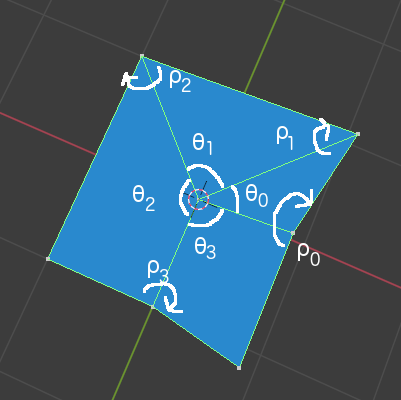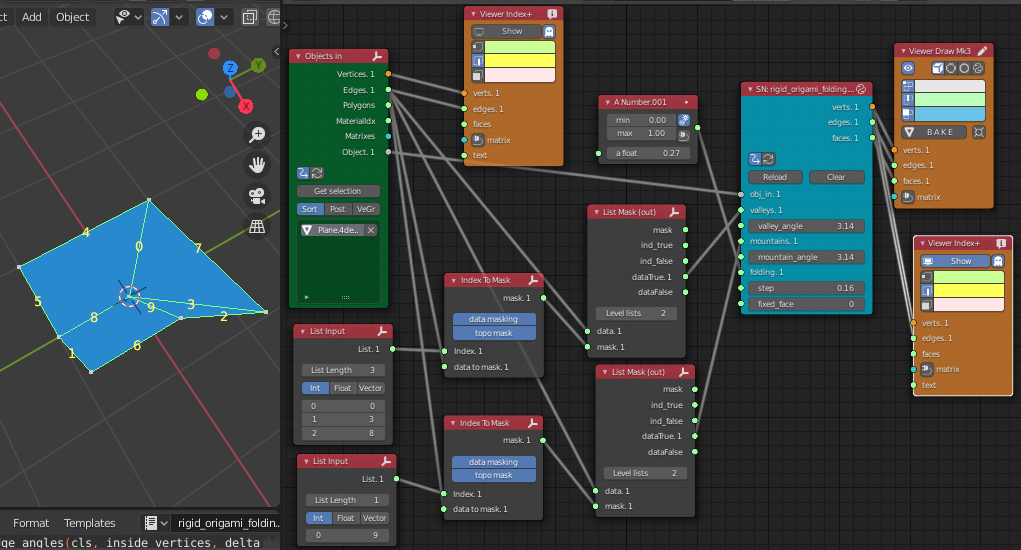Rigid Origami Folding in Blender with add-ons

Updated (Aug 23, 2020)
This script node was already merged in sverchok's master. So you can use rigid origami node in sverchok (select modifier change -> rigid origami) without using this script node.
And when this node was merged, some socket interfaces has been changed.
- object socket -> verts/edges/faces socket
- valleys/mountains and valley/mountain angle -> fold edge indices/angles
To get the details, please visit the following pull request. https://github.com/nortikin/sverchok/pull/3416
Overview
Researches about origami are currently active in computer graphics field. Though there are still many restrictions, many patterns also can be folded. In this article, I wrote a script to be able to fold some origamis with Blender's add-on, sverchok, following some thesis about rigid origami folding.
Theory of Rigid Origami Folding
Though there are some informative articles about origami, I'll mainly follow an article of Rigid origami simulation1. In the article, the main topic is kinematics of rigid origami. In the beginning, there is an explanation about edge angles around a single vertex.

Around a vertex inside of a paper, rotation matrices satisfies following equations.
Partial derivative of the constraint function is represented in the following form using independent a, b and c.
To get the delta rho angles of the edges, use the following equations with the each variables of a, b and c. And this is the single vertex version. To know the multiple vertices version, please read the original article.
Implementation
I uploaded the code to my GitHub page. This code can be used in sverchok's SNLite script node. https://github.com/asahidari/rigid_origami_folding_b3d
How to use it
sverchok
After download the script file, open it in text editor inside Blender. After that, you can load the script into the sverchok's script node.

This is the image of the script node.
 Parameters:
Parameters:
- obj_in: paper object which has some edges inside
- valleys: valley fold edge list
- valley_angle: angle (radian) of valley edges
- mountains: mountain fold edge list
- mountain_angle: angle (radian) of mountain edges
- folding: ratio of the folding angle (0 to 1)
- step: delta rho angle step (for example, pi * 0.005, pi * 0.01, pi * 1.0)
- fixed_face: index number of fixed face
Next image is an example of usage.

Animation Nodes
(constructing)
Limitations
- This code is not yet merged in sverchok (July 2020).
- As the original article says, some crease patterns may not be folded appropriately.
- It may be difficult to find where error occurs when there are something wrong. I wish these points would help you to solve the problems.
- Confirm that all edges inside of the paper are used as valleys or mountains.
- Avoid including peripheral edges (Probably nothing wrong happen, but it may confuse you).
- Check if some valley edges were wrongly included in mountains (and vice versa).
- When the result is none or slightly move, try to change the 'step' parameter (math.pi * (0.001 ~ 1.0)) This may sometimes goes well.
- To find foldable origami fold patterns, try to search for images with the words like "crease lines origami".
References
- https://origami.c.u-tokyo.ac.jp/~tachi/cg/RigidFoldableQuadMeshOrigami_tachi_IASS2009.pdf
- https://origami.c.u-tokyo.ac.jp/~tachi/cg/DesignOfRigidOrigamiStructures_tachi_IASS2010.pdf
- https://www.grasshopper3d.com/group/kangaroo/forum/topics/new-origami-example
- http://mars.wne.edu/~thull/rigid/rigid.html